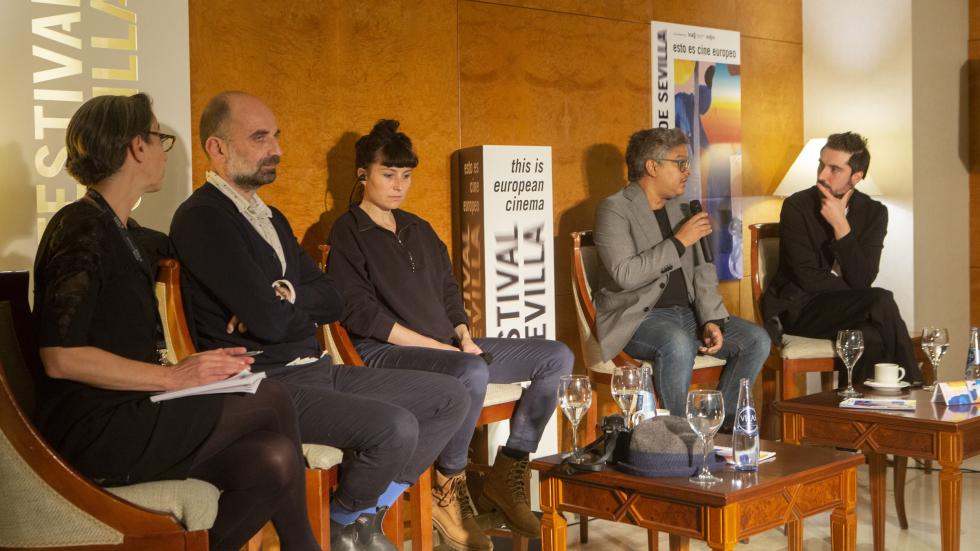The meeting gathered Rachel Lang, Massimo D'Anolfi, Nino Martínez Sosa, Nicolas Peduzzi, Araceli Lemos and David Pantaleón.
Seville, 7 November 2021 - The second day of 'Coffee with...' brought together six European directors this Sunday at the Sevilla Center Hotel. On the one hand, Rachel Lang (Our Men), Massimo D'Anolfi (Guerra e pace) and Nino Martínez Sosa (Liborio) led the talk with war as a nexus, while Nicolas Peduzzi (Ghost Song), Araceli Lemos (Holy Emy) and David Pantaleón (Rendir los machos) discussed the revolutionary nature of their feature films.
The Thousand Faces of War
Dominican director Martínez Sosa was the first to speak. His film Liborio focuses on the story of Olivorio Mateo Ledesma, known as Papá Liborio. Legend has it that after disappearing for seven days, he reappeared to become a healer, prophet and guerrilla fighter, generating a legion of followers. "Not much is known about this character. We didn't intend to make a historical film but it is based on a fact. It is difficult to approach this figure because everyone has their own vision in their head," the filmmaker explained in the talk.
War is a complex subject and immortalised in film in different ways. French filmmaker Rachel Lang has delved into the "feminine aspect" in her film Our Man. The director, who graduated as a lieutenant in the French army and is currently a reservist, has conducted a documentary research by interviewing families of the French foreign legion living on the island of Corsica: "In the French army I know many soldiers, but I didn't know what it was like for a foreign woman to live on a small island with her children waiting for their husbands. I started to write this fiction based on the story of two military couples," explains the filmmaker.
In his film Guerra e pace, Italian filmmaker Massimo D'Anolfi explores "the importance of images in society". To do so, together with his partner Martina Parenti, he has travelled through different war archives from the 20th century, starting with the colonialist view of Italy's invasion of Libya in 1911. The filmmaker pointed out that after those black and white images, technological progress has led to an overload of documents filmed on smartphones or security cameras, which generates a certain confusion when it comes to explaining these stories.
A revolutionary look
In the second part of the session, French director Nicolas Peduzzi spoke about Ghost Song, the film he is presenting at the 18th SEFF. The film is a mixture of psychedelia and folklore using Houston as a backdrop, a conservative city in the United States that is nevertheless full of rhythmic sensations thanks to Afro-American rap. "It's a very segregated city. Both sides have the same rejection and the same experiences, but also the same talent when it comes to expressing themselves in different musical fields", says the director.
Desegregation and the need to fit in are also discussed by Greek director Araceli Lemos in her film Holy Emy. The central focus of this feature film is the Filipino community living in Athens. "You see many groups of women every day working as domestic employees. After I discovered the story of the secret of these two women and delved into this very small community, I saw that these people are not monitored," says the filmmaker, who says that she does this catalytic work to eliminate some prejudices: "I discovered a very welcoming community, all the churches wanted to welcome new members and many people showed unpredictable interest. I was delighted to discover a second generation of Filipinos who wanted to be part of Greece".
Concluding the round table, the Canarian filmmaker David Pantaleón, whose film Rendir los machos opened this year's New Waves section, recalled a moment in his feature film in which he drew a parallelism between the backstage of a film festival and a livestock fair. "The ranchers also have their private space, to the point that Juan "El Chapa '' sings a ranchera dressed as a Mexican to his fans and ranchers". Theirs is a story that feeds on the magic of the countryside and traditions, a kind of hidden irony that the viewer doesn't understand until the end of the film.







